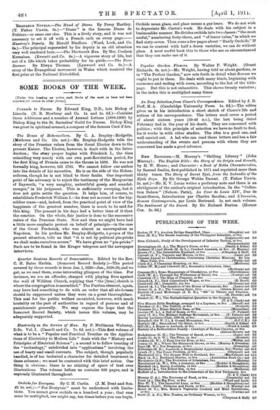The House of Hohenzollern. By C. A. Brayley -Hodgetts. (Methuen
and Co. 15s. net.)—Mr. Brayley-Hodgetta tells the story of the Prussian rulers from the Great Elector down to the present Kaiser. The Elector, however, is dealt with in the Intro- duction ; the story proper begins with Friedrich I., the time coinciding very nearly with our own post-Revolution period, for the first King of Prussia came to the throne in 1688. He was not formally king, however, till 1701. We cannot follow our author into the details of his narrative. He is on the side of the Hohen- zollarm3, though he is not blind to their faults. One important point of his advocacy is to reject the testimony of the Margravine of Bayreuth, "a very naughty, untruthful gossip and scandal- monger," in his judgment. This is sufficiently sweeping, but it does not quite settle the question. It helps him, of course, to rehabilitate Frederick William I.—he does not account for the big- soldier craze—and, indeed, from the practical point of view of the happiness of the greatest number, there is much to be said for this king. The peasant in his days had a better time of it than the courtier. On the whole, fair justice is done to the successive rulers of the Prussian State. Now and then we might have had a little more emphatic protest on behalf of principle—in the case of the Great Frederick, who was almost as unscrupulous as Napoleon. In his preface Mr. Brayley-Hodgetts, a propos of the present situation, tells us that "it is not by political pin-pricks we shall make ourselves secure." We have given no "pin-pricks." Such are to be found in the Kruger telegram and the newspaper interviews.










































 Previous page
Previous page